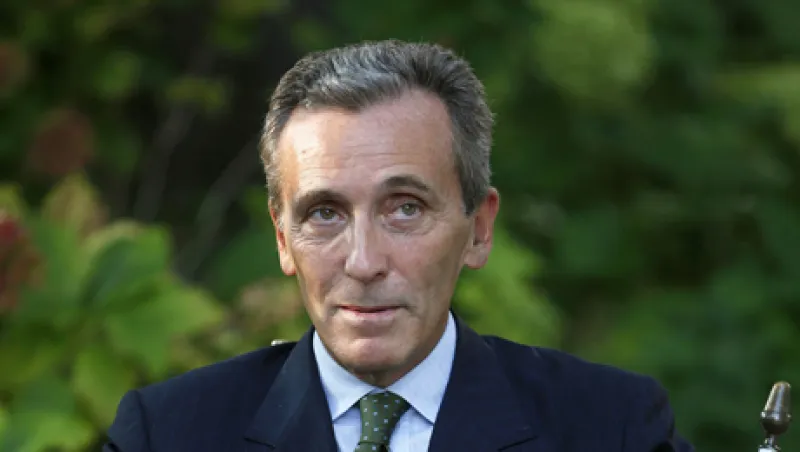Many investors are betting that Italy will ultimately have to request a European bailout program in order to get the European Central Bank to buy its bonds and keep down financing costs. Vittorio Grilli begs to disagree.
The Italian finance minister insists that a new three-year budget plan agreed by the government last week has put the budget deficit firmly under control and will enable the country to begin chipping away at its debt, which at just over 120 percent of gross domestic product is the largest in the euro area after Greece’s.
“The right question is why would Italy need a program, not 'why not?'” Grilli told Institutional Investor in an interview in Tokyo over the weekend, where he was attending the annual meetings of the International Monetary Fund and the World Bank. Countries seek bailout programs if they can’t finance their deficits or if they need money to recapitalize their banks, he said, adding, “We don’t need either.”
“All we need is to roll over our debt in a decreasing fashion,” Grilli said. “What we need is a normal environment in financial markets so that investors investing in our bonds don’t feel threatened by disruptive events like a euro breakup.”
The budget plan for 2013-2015, which was agreed upon by the government of Prime Minister Mario Monti, seeks to reduce the deficit to 1.8 percent of GDP next year from 2.6 percent this year. In cyclically adjusted terms, which discounts the impact of the country’s recession on the deficit, the budget should be in balance next year, achieving one of the prime goals that Monti set out when he replaced Silvio Berlusconi at the head of a technocratic government in November 2011.
The budget contained fresh cuts in healthcare and regional spending. It also combined a one-percentage-point increase in Italy’s value-added tax, to 22 percent, with a one-point cut in income tax rates for lower income people.
Many economists have criticized Italy for relying largely on tax increases in the past to close its deficit, arguing that that’s one of the main reasons why Italy has had the poorest growth record of any major euro area country. Pairing the VAT hike with an income tax cut was “a better combination to have a chance to improve domestic consumption,” Grilli said.
Italians will be hoping he’s right. By the government’s own estimate, the economy will contract by 2.4 percent this year and by 0.2 percent next. But Grilli insisted that the government’s fiscal restraint combined with structural reforms, including measures making it easier to hire and fire workers and a new privatization program that aims to raise €15 billion a year, will lay the foundations for growth to resume.
“We have to deleverage the public sector and leave resources for the private sector,” Grilli said. “We are very sure that the potential output, because of the reforms, has increased substantially.”
Even without a growth spurt, the new budget should put Italy’s debt on a diet. Assuming a 1 percent growth rate, 2 percent inflation and the government meets its privatization target, the debt-to-GDP ratio would fall by 4 percentage points a year, Grilli claimed.
The budget still needs to win approval in parliament, and already the plan has drawn criticism from the left and right of the political spectrum. That begs the question of whether Italy can stay on a sound fiscal course after next April, when normal politics are due to resume with parliamentary elections and Monti is expected to step aside.
The good news, in Grilli’s view, is that any government will be bound by the much tighter budgetary framework that EU leaders have imposed on the euro area as a result of the crisis. In April, Italy has amended its constitution to require a balanced budget, a step that other euro area governments have also taken.
“The amount of precommitment that any government will have to face when elected is such that really the path is very narrow,” Grilli said. “I don’t know what’s next in terms of what the next election will deliver, but I’m pretty sure that the economic agenda of any government in Europe, not just in Italy, is pretty well predefined by our common agreement at the head of state and minister of Finance level. We have been working on a common agenda that has been very detailed in terms of fiscal and structural reform that everyone has been deploying. That will not stop because of any election around Europe.”






